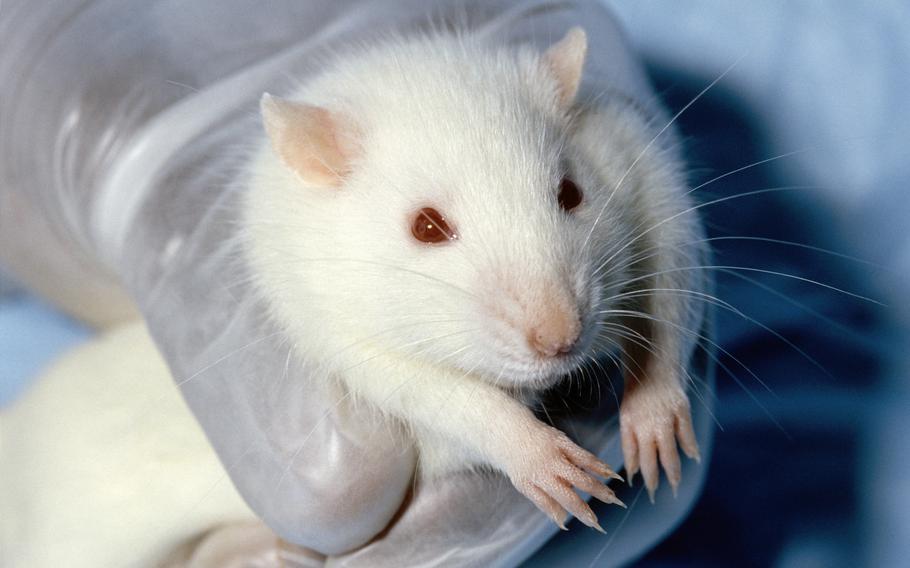
A white rat is held by a latex gloved hand. People for the Ethical Treatment of Animals on Thursday, July 20, 2023, sent a letter to the Pentagon asking the Navy stop funding what the group says are “disturbing” research tests on animals such as including mice and rats at four major universities. (Janet Stephens/National Cancer Institute)
WASHINGTON — People for the Ethical Treatment of Animals on Thursday sent a letter to the Pentagon asking the Navy stop funding what the group says are “disturbing” research tests on animals at four major universities.
PETA’s letter comes five months after the animal-rights group claimed a small victory when the Navy stopped funding similar lab tests on sheep at the University of Wisconsin-Madison. The purpose of the tests is to gather more scientific data about how certain illnesses and conditions in high-pressure environments affect humans.
“PETA has recently obtained separate records confirming that the Navy is currently funding and/or has recently funded cruel and ineffective [decompression sickness] and oxygen toxicity tests on other animals such as mice and rats at Duke University, the University of Maryland–Baltimore, the University of California–San Diego and the University of South Florida,” the organization wrote in the letter to Defense Secretary Lloyd Austin and Navy Secretary Carlos Del Toro.
The Navy had said the sheep tests ended because the studies were completed — not because of PETA’s protest.
Decompression sickness is often seen in scuba divers who swim from great depths to the surface too quickly. In those cases, the quick ascent doesn’t allow enough time for nitrogen in the blood and tissues to return to the lungs to be exhaled. The ailment can be deadly if not treated quickly. The Navy’s goal with the research is to learn more about decompression sickness — known commonly as “the bends” — but PETA contends those tests on animals are out of step with international standards and scientifically inferior to alternate methods.
“Modern, non-animal technology is available for studying [decompression sickness] based on human tissue and data obtained from human divers,” PETA wrote in the letter, noting one alternate method is in vitro study of human endothelial cells, which gives scientists valuable “evidence in simulated diving conditions.”
PETA said documents obtained from a public records request show Duke received about $845,000 in Navy funding last year to do the animal tests. The University of Maryland-Baltimore got more than $980,000 and the University of California-San Diego and University of South Florida received about $1 million each. The combined Navy funding for the tests at all four universities is about $3.8 million. Some of the tests are scheduled to continue until 2025, the group said.
Defense Department officials declined to comment about the testing or PETA’s letter.
“We are asking them to … acknowledge that the navies of France and the U.K. have already banned the use of animals for decompression studies. This is a thing of the past. This doesn’t need to be happening now,” PETA Vice President Shalin Gala said. “Hopefully, the U.S. Navy will make the decision to ban these sorts of cruel and deadly tests across the board.”
The group wrote thousands of mice and rats — some of them just a few weeks old — are being subjected to the tests. In one study, the rodents are injected with an experimental agent, exposed to high-pressure oxygen and endure electric shocks if they can’t keep up on a treadmill. In others, animals are having holes drilled in their heads so that chemicals can be injected into their brains.
“There is no scientific, legal or ethical justification” for using these animals to study decompression and oxygen toxicity, the group said.